You are here
New Releases
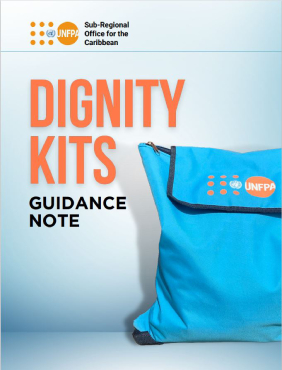
UNFPA Caribbean Dignity Kits Guidance Note
Dignity Kits are thought to be a resource to support meeting the above-mentioned needs, where women and girls can receive essential supplies, such as menstrual health products (disposable/reusable sanitary pads, menstrual cups, menstrual discs), condoms, underwear, soap, shampoo, toothpaste, relevant clothing items, etc. They also contain items that can contribute to increasing safety and security, such as radios, whistles, flashlights, and buckets/bags. Additionally, lifesaving information about services available for them, where to access them and how, especially related to the response to GBV and access to sexual and reproductive health (SRH) services. The provision of Dignity Kits contributes to survival in the immediate aftermath of an emergency and supports women and girls in using their limited resources to purchase other critical items. Additionally, they contribute to recovery efforts by engaging women and girls in economic empowerment activities. Dignity Kits are not a standard Hygiene Kit, and its programming and distribution should not be conducted in a standard manner, without following specific procedures outlined in this guidance note.
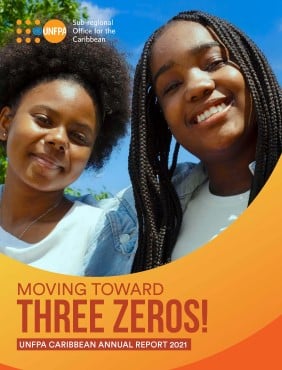
UNFPA CARIBBEAN ANNUAL REPORT 2021 - MOVING TOWARD THREE ZEROS!
As the United Nations’ sexual and reproductive health agency, UNFPA’s mission is to deliver a world where every pregnancy is wanted, every childbirth is safe and every young person’s potential is fulfilled. This is the case globally and in the Caribbean where we serve 22 Dutch and English speaking countries and territories.
In 2021, the Caribbean faced four major humanitarian challenges at once: the Venezuelan migrant and refugee crisis, which has become the largest regional human displacement crisis in recent history with an estimated 150,000 Venezuelan migrants/refugees having settled in Aruba, Curacao, Guyana and Trinidad and Tobago; the annual Atlantic hurricane season putting 16 out of 22 countries and territories at risk; other natural disasters, such as the volcanic eruption in Saint Vincent and the Grenadines and the extreme flooding in Guyana; and the global COVID-19 pandemic.
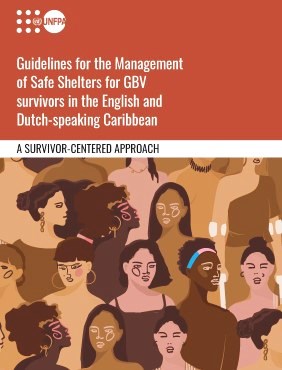
Guidelines for the Management of Safe Shelters for GBV survivors in the English and Dutch-speaking Caribbean - A SURVIVOR-CENTERED APPROACH
The purpose of these guidelines is to provide practical guidance for the management of safe shelters and alternative accommodations for GBV survivors in the English and Dutch-speaking Caribbean. Notwithstanding, these guidelines may also be of use to individuals that work in other services with GBV survivors and in GBV responses, such as NGOs and local governments and authorities.
Although there is extensive literature on setting up safe shelters in emergencies and on the response to GBV, UNFPA identified a general gap around the provision of guidelines to set up and manage safe shelters and alternative accommodation for survivors of GBV. These guidelines are the result of an extensive regional desk review, online survey and subsequent semi-structured interviews with safe shelter managers from the English and Dutch- speaking Caribbean countries. These countries are not homogenous and the different experiences shared by safe shelter managers in the region will undoubtedly contribute to a wider understanding of the situation regarding this segment of the GBV response. The guidelines are therefore to be adapted by safe shelters throughout the region in accordance to their reality. While these guidelines are directed at the Caribbean and were built taking into account the expertise and experience of safe shelter managers in the region, safe shelter managers in other parts of the world are welcome to make use of them and to adapt them to their context.
These guidelines address the practical and functional aspects of setting up a safe shelter for GBV survivors, while focusing on a survivor- centred approach and on the principles of non- discrimination, respect, safety and confidentiality. Therefore, an important part of these guidelines concentrates on the accessibility of survivors and on the services to be provided in the safe shelters. Focus is also given to preparedness and response activities related to natural disasters and humanitarian emergencies as these increase the vulnerability of women and girls, further exposing them to GBV. It should be stressed that safe shelters should take all appropriate and possible steps to prepare for disasters and emergencies so that they are not caught off guard and do not have to resort to improvisation.
This work is also an invitation for other initiatives to be elaborated on safe shelters and alternative accommodations in other regions of the world. The sharing of experiences, findings, challenges and best practices will further enrich the literature and research around this topic.
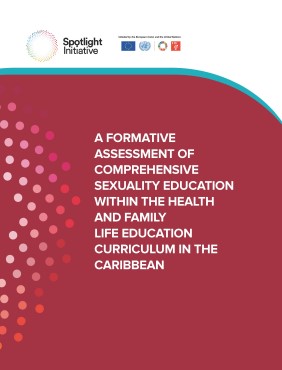
A Formative Assessment of Comprehensive Sexuality Education within the Health And Family Life Education Curriculum in the Caribbean
UNFPAs State of the World Population 2013 highlighted some of the socio-economic consequences associated with adolescent pregnancies. These included missed educational and other oSexuality is pivotal to the health of a nation. The result of healthy sexuality are citizens that are comfortable with themselves and able to make informed and responsible decisions, form healthy relationships, and take care of their bodies. Comprehensive sexuality education (CSE) plays a central role in preparing young people for a safe, productive, fulfilling life in a world where far too much still has the potential to negatively affect their health and well-being. There is clear and compelling evidence worldwide for the benefits of high-quality, curriculum-based CSE in empowering youth to take control of and make informed decisions about their sexual health and relationships. Without CSE, many young people approach adulthood faced with conflicting, negative and confusing messages about sexuality which ends up putting them at higher risk for HIV and AIDS, sexually transmitted infections (STIs), unintended pregnancies, gender-based violence (GBV) and more. These risks, and their negative outcomes, significantly impede young people’s ability to fulfil their potential.
Despite the extensive research demonstrating the far-reaching positive impacts of CSE, in many societies, attitudes and laws discourage public discussion of sexuality, including teaching it in school. This includes some parts of the Caribbean.
In response to this, the UNFPA Sub-Regional Office for the Caribbean (SROC) contracted with an independent consultant to conduct a formative assessment of comprehensive sexuality education within the Health and Family Life Education (HFLE) curriculum in schools in the Caribbean. This assessment was performed to compare what is currently being provided against international best practices; in particular, the International Technical Guidance on Sexuality Education (ITGSE) (UNESCO, 2018). To date, UNFPA and the Caribbean Community (CARICOM), along with additional partners, have done extensive work determining how best to support the youth living in the region. This assessment was designed to learn from that work, while filling gaps in the scope of those explorations and guidance documents.pportunities, perpetuation of poverty and exclusion, basic human rights denied and the ongoing unfulfilment of girls’ potential. UNFPA argues that the action taken by many countries have been focused primarily on changing the behaviour of the girl and not addressing the underlying determinants. Among the main determinants identified are child marriages, gender inequality, poverty, sexual violence and coercion, lack of access to education and reproductive health services and national policies restricting access to contraception. It is the view of the UNFPA (2013, ix) that the action taken by many countries, aimed at preventing adolescent pregnancy, and in some cases to support girls who have become pregnant, have been primarily about changing the behaviour of the girl rather than addressing the underlying determinants outlined.
A 2017 joint report by Pan American Health Organization (PAHO), UNFPA, and the United Nations Children Fund (UNICEF) informed that Latin America and the Caribbean (LAC) was the only region in the world reporting an increase in adolescent pregnancy over time. The United Nations estimates for the period 2015–2020 show a rate of 63.0 per 1,000 girls 15–19 years old in LAC, compared to a global average of 42.5 per 1,000 girls. For Guyana, the rate estimated for 2015–2020 is 74.4 per 1,000 girls 15–19 years old, about 1.2 times greater than the average for the LAC region.
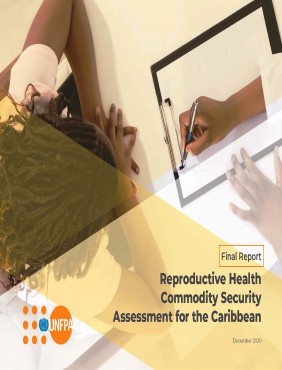
Reproductive Health Commodity Security Assessment for the Caribbean
UNFPA is committed to achieving three transformative and peoplecentred results by the year 2030: to end preventable maternal deaths, to end the unmet need for family planning, and to end gender-based violence and harmful practices. The UNFPA transformative results are closely aligned with the Sustainable Development Goals (SDGs), particularly SDGs 3 and 5 (Good Health and Well-being; and Gender Equality), as well as with the International Conference on Population and Development (ICPD) Programme of Action.
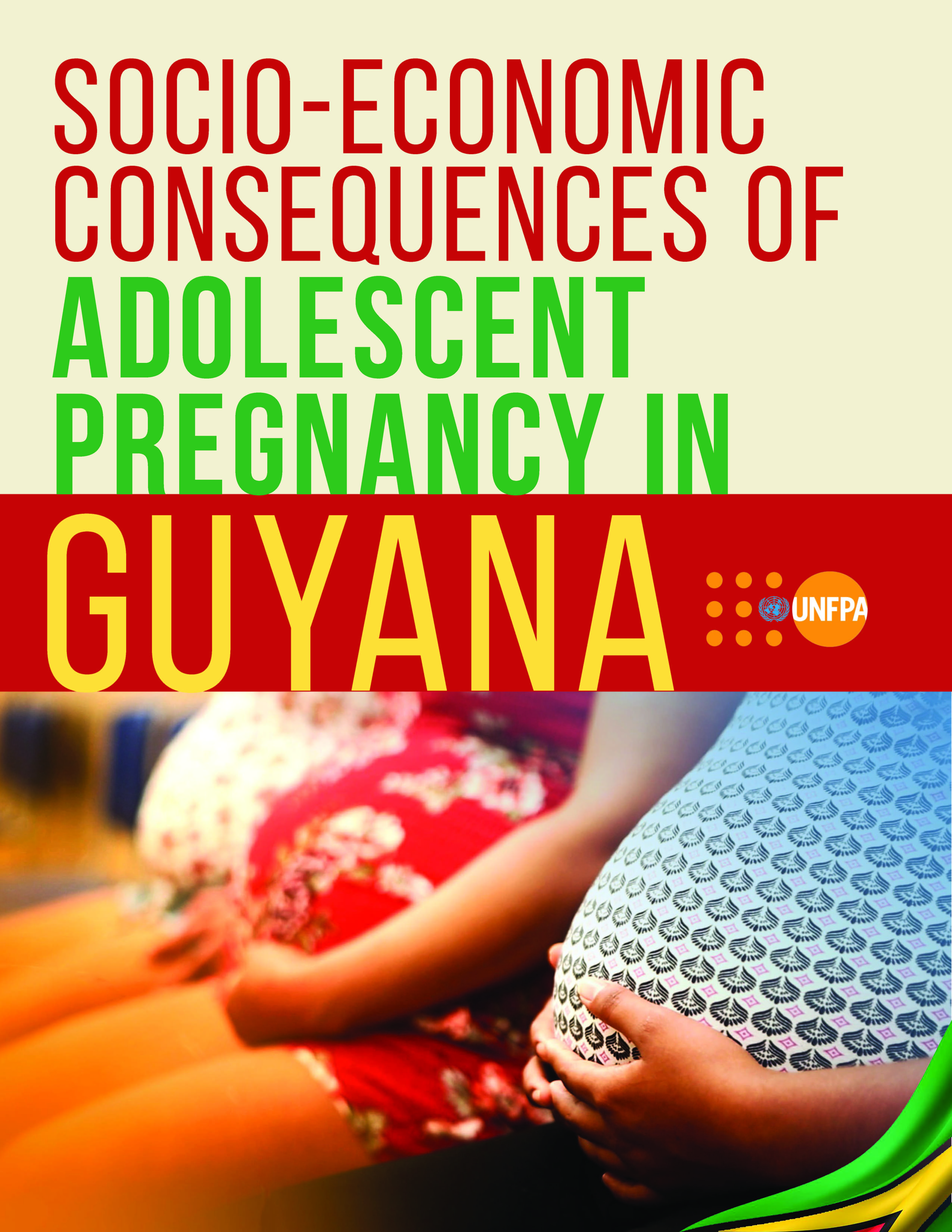
Socio-Economic Consequences of Adolescent Pregnancy in Guyana
UNFPAs State of the World Population 2013 highlighted some of the socio-economic consequences associated with adolescent pregnancies. These included missed educational and other opportunities, perpetuation of poverty and exclusion, basic human rights denied and the ongoing unfulfilment of girls’ potential. UNFPA argues that the action taken by many countries have been focused primarily on changing the behaviour of the girl and not addressing the underlying determinants. Among the main determinants identified are child marriages, gender inequality, poverty, sexual violence and coercion, lack of access to education and reproductive health services and national policies restricting access to contraception. It is the view of the UNFPA (2013, ix) that the action taken by many countries, aimed at preventing adolescent pregnancy, and in some cases to support girls who have become pregnant, have been primarily about changing the behaviour of the girl rather than addressing the underlying determinants outlined.
A 2017 joint report by Pan American Health Organization (PAHO), UNFPA, and the United Nations Children Fund (UNICEF) informed that Latin America and the Caribbean (LAC) was the only region in the world reporting an increase in adolescent pregnancy over time. The United Nations estimates for the period 2015–2020 show a rate of 63.0 per 1,000 girls 15–19 years old in LAC, compared to a global average of 42.5 per 1,000 girls. For Guyana, the rate estimated for 2015–2020 is 74.4 per 1,000 girls 15–19 years old, about 1.2 times greater than the average for the LAC region.
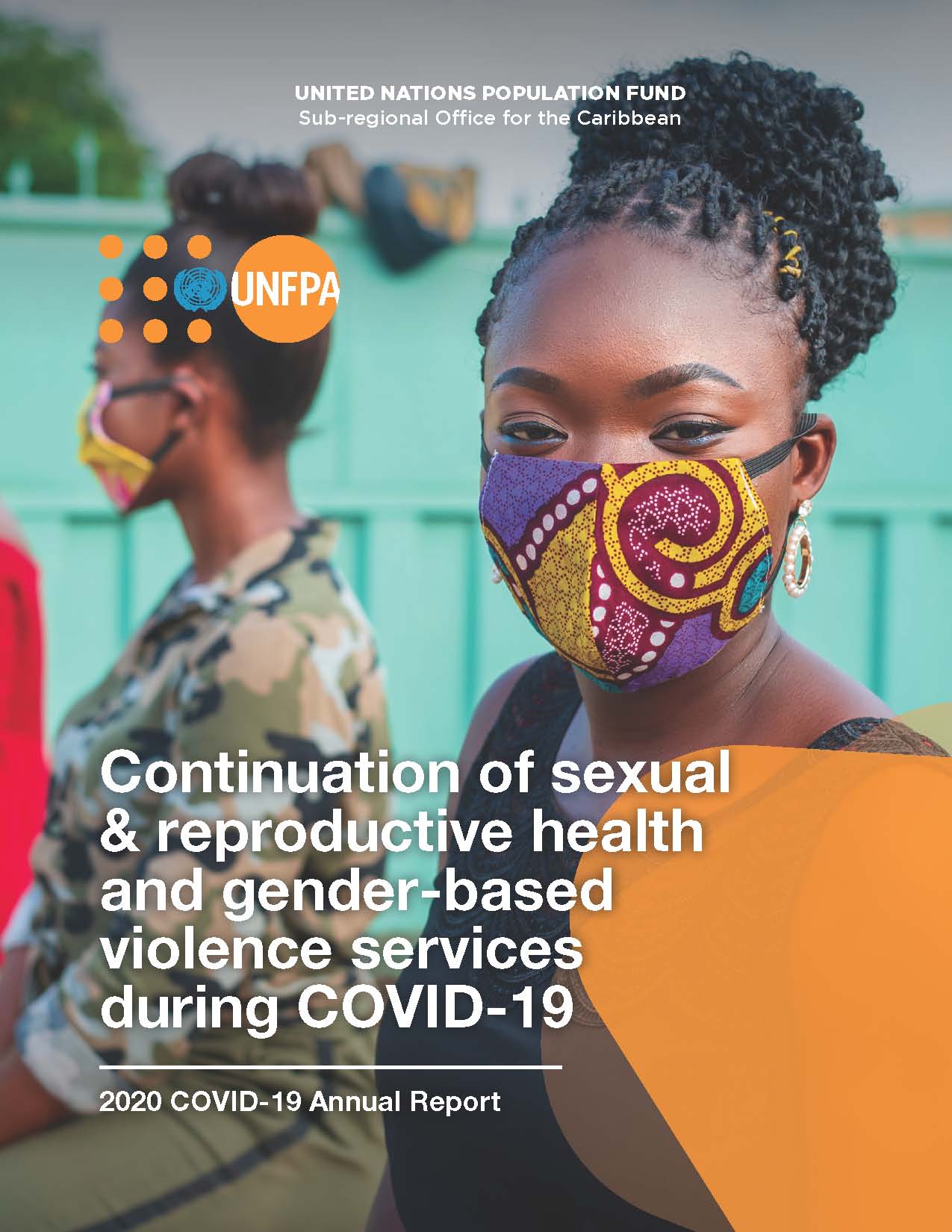
Covid-19 Annual Report 2020 - UNFPA SROC
The United Nations Population Fund (UNFPA) is the Sexual and Reproductive Health and Rights (SRHR) agency of the United Nations and leads the global effort to achieve a world where every pregnancy is wanted; every child birth is safe; and every woman and girl lives a life free from violence and abuse. UNFPA promotes the right of every woman, man and child to enjoy a life of health and equal opportunity, and applies a human rights and culturally sensitive approach, supported by evidence-based advocacy and policy dialogue to address issues of sexual and reproductive health, gender equality, youth and population dynamics. UNFPA’s work is guided by its aim to achieve three transformative results by 2030: zero preventable maternal deaths, zero unmet need for family planning, and zero gender-based violence and harmful practices.
UNFPA Sub-Regional Office for the Caribbean serves 22 countries and overseas territories in the English and Dutch-Speaking Caribbean. These include: Anguilla, Antigua and Barbuda, Aruba, The Bahamas, Barbados, Belize, Bermuda, British Virgin Islands, the Cayman Islands, Curacao, Dominica, Grenada, Guyana, Jamaica, Montserrat, St Kitts and Nevis, St. Lucia, St. Maarten, St. Vincent and the Grenadines, Suriname, Trinidad and Tobago and the Turks and Caicos Islands. Increasing national capacities to advocate for and deliver policies and programmes for access to integrated and quality sexual and reproductive health (SRH) and gender-based violence information and services is at the heart of UNFPA’s support in the Caribbean.
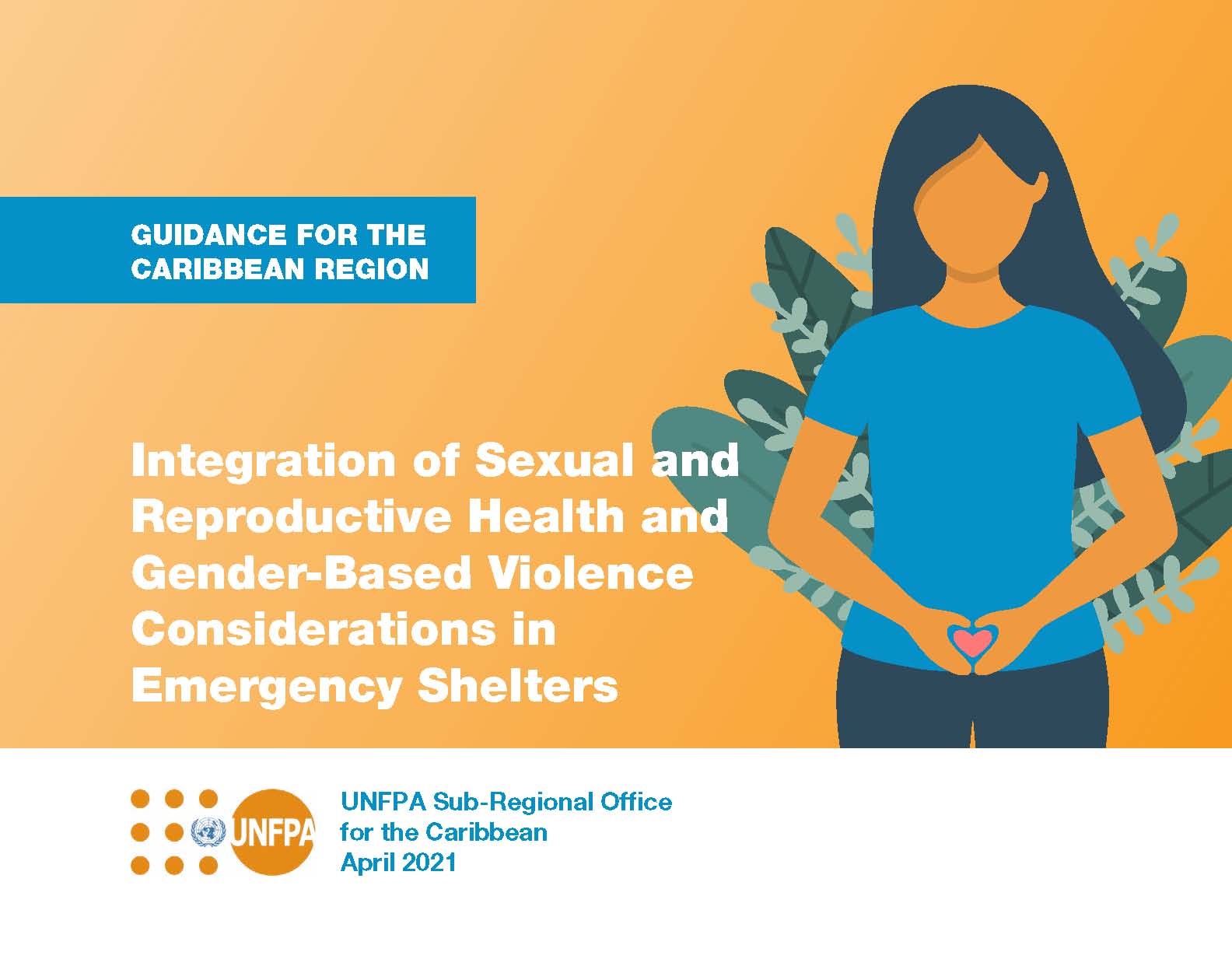
Integration of Sexual and Reproductive Health and Gender-Based Violence Considerations in Emergency Shelters
The purpose of this guide is to support shelter managers and coordinators as well as Health Providers, National Ministries of Health (MoH), National Gender Machineries (NGM), National Bodies for Disaster Management and Humanitarian Coordination bodies to reduce the risks of Gender-Based Violence (GBV) and integrate essential
actions for the provision of lifesaving Sexual and Reproductive Health (SRH) and GBV response services in emergency shelters through improved planning and response actions. This guidance should be used before the onset of an emergency for planning purposes, and also serves as a technical guidance that should be used when responding to an emergency. Each country is encouraged to adapt it based on the nature of the emergency and particular national policies and protocols around SRH and GBV.
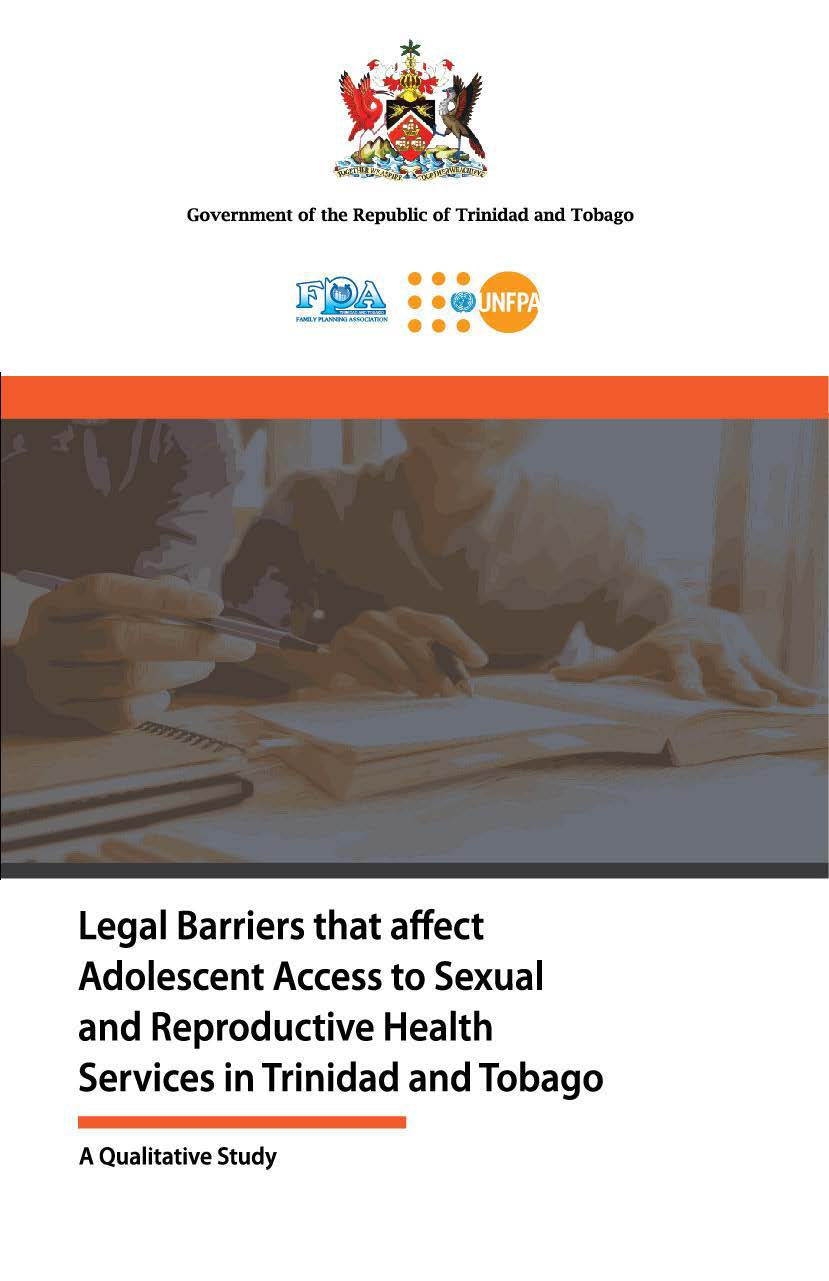
Legal Barriers that affect Adolescent Access to Sexual and Reproductive Health Services in Trinidad and Tobago
Trinidad and Tobago's legislative framework, which establishes the age of sexual consent as 18, prevents adolescents under the age of 18 from accessing Sexual and Reproductive Health (SRH) services and information. Legal Barriers that affect Adolescent Access to Sexual and Reproductive Health Services in Trinidad and Tobago is a qualitative study of minors and service providers undertaken to generate evidence on the legislative gaps and on the factors that facilitate as well as hinder adolescents' access to SRH services and information. This research has been conducted with the intent of building knowledge and capacity to respond to adolescents' SRH needs, as well as informing policymakers in developing policy and legislative reform.
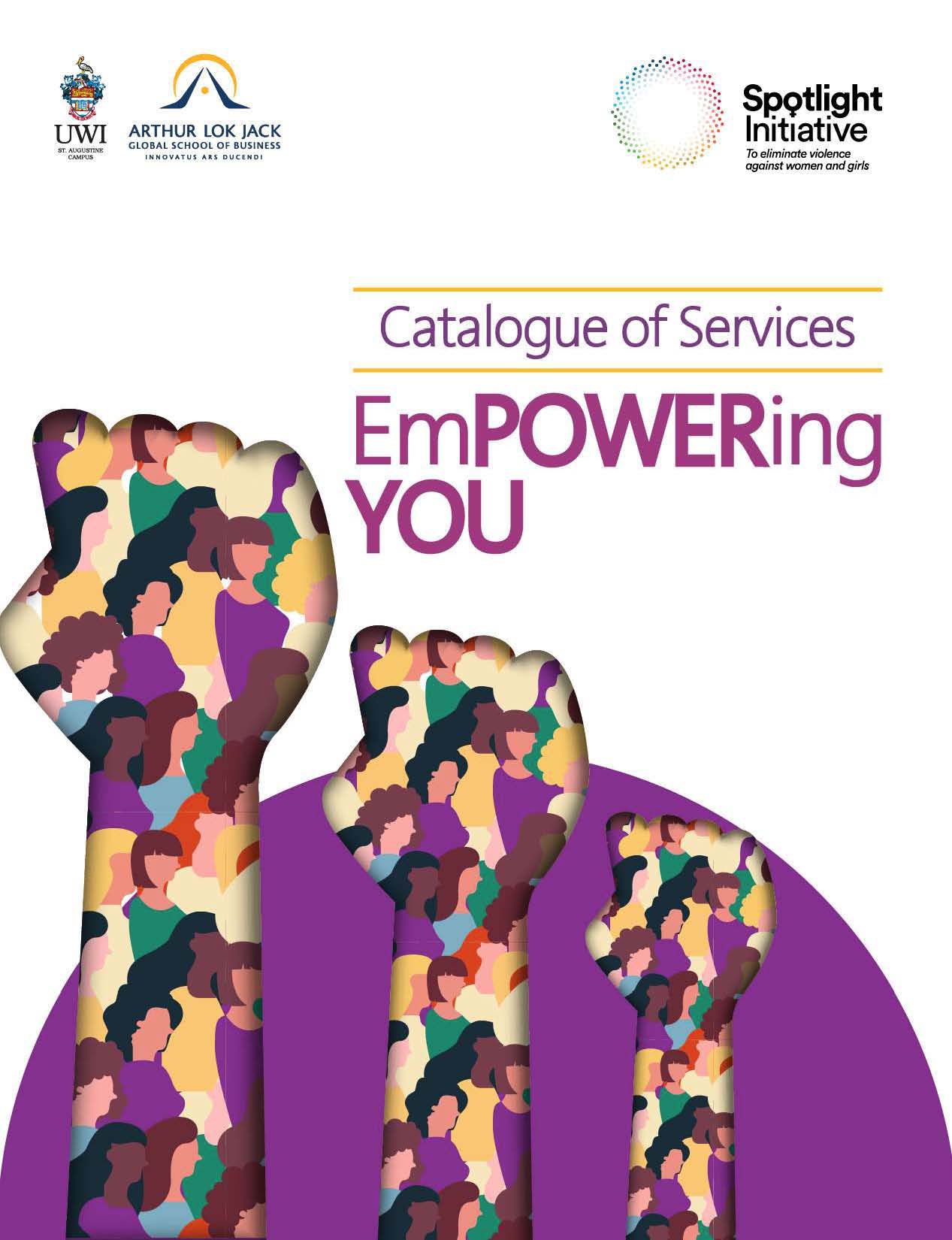
Catalogue of Services for the Empowerment Women in Trinidad and Tobago - Spanish and English
The Catalogue of Services acts as a resource guide for victims and survivors of gender based violence seeking support services to enhance their economic security, and increased autonomy and well-being, thus making them less dependent on their abusive partners. Further, it is a resource for service providers and first responders to have access to information as they respond to individuals and families affected by family violence. The Catalogue will strengthen and complement the existing sources of information that are available to survivors to improve their social, psychological and physical wellbeing. It is hoped that survivors will use the information in the Catalogue to increase their employability and their capacity to generate a higher income.